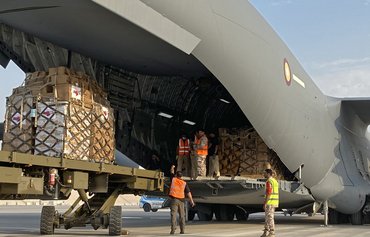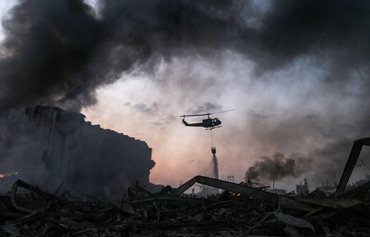Beirut resident Joumana Daibes observed operations to remove the rubble at the city's Saint George Hospital University Medical Centre with profound sadness.
The hospital had not yet completed planned rehabilitation and expansion work when the Beirut port explosion destroyed all the newly built sections and most of the other departments.
"It is a huge loss," she told Al-Mashareq. "The last thing we needed was this explosion, as we have not yet recovered from the economic collapse and the coronavirus outbreak."
The August 4th blast also caused massive damage to Wardieh Hospital in Gemmayze and Geitaoui and Hotel Dieu hospitals, among others, leaving Lebanon's teetering health sector on the verge of collapse.
![The August 4th blast at Beirut port destroyed newly built sections of Saint George Hospital University Medical Centre. [Photo courtesy of Saint George Hospital University Medical Centre]](/cnmi_am/images/2020/09/02/25740-Lebanon-Beirut-Ashrafieh-600_384.jpg)
The August 4th blast at Beirut port destroyed newly built sections of Saint George Hospital University Medical Centre. [Photo courtesy of Saint George Hospital University Medical Centre]
In the wake of the successive crises that have roiled Lebanon, Daibes had harsh words for the political class, saying it has "surrendered to Hizbullah, and the country now is moving backwards, just like Iran is today".
Many Lebanese hold Hizbullah responsible for the failure of the political system, accusing the country's politicians of deferring to the Iran-backed party.
Sector beset by setbacks
The Beirut port explosion "caused direct damage to the hospitals in Beirut and its suburbs, knocking three hospitals out of service", Private Hospital Owners' Syndicate president Suleiman Haroun told Al-Mashareq.
The cost of the damage these hospitals sustained "is estimated at $80 million", he said, a figure that is compounded by the dues the state has failed to pay since September 2019, amounting to $1.35 billion.
In a November report, Human Rights Watch noted the government's failure to reimburse private and public hospitals, including funds owed by the National Social Security Fund and military health funds.
This made it difficult for hospitals to pay staff and purchase medical supplies, it said, noting that a dollar shortage also restricted the import of vital goods and led banks to curtail credit lines.
Before the Beirut port blast, the private hospital sector was "already on the brink of collapse, and today it is threatened with a full collapse", Haroun said, with many hospitals unable to admit patients, despite the great need.
At least part of the blame lies with the failed state, its mismanagement and failure to establish an effective health sector administration, he said, accusing Hizbullah and some other political parties of covering up corruption.
Failure of political system
According to Lebanese MP Fadi Saad, an orthopedic surgeon, Hizbullah "bears responsibility for the failure of the political system to address the successive crises that plague Lebanon".
Hizbullah is the only faction to have kept its weapons after the end of the country's civil war, which many regard as an obstacle to democratic reform. Its involvement in foreign conflicts, including Syria, also has been a sticking point.
The party's weapons and its failure to adhere to Lebanon's policy of dissociation "are the biggest problem we face, because they led to harming Lebanon's relations with its Arab and international friends", Saad said.
"Hizbullah is the root of Lebanon's problems and the cause of its economic collapse, and it is now driving its health sector's collapse," he added.
He pointed out that the deterioration of the health sector "was not caused by the port explosion only, as it began with Hizbullah taking control of the Ministry of Health and directing the purchase of medicine from Iran".
"No state can exist in the shadow of [Hizbullah], a party that dominates it with power and weapons, and via politicians who derive influence from associating with it," media activist Ghada Eid told Al-Mashareq.
Hizbullah presents a difficult challenge for Lebanon, she added, because it "prevents the establishment of an institutional state".

![Beirut's Wardieh Hospital suffered massive damage in the August 4th explosion at the city's port. [Nohad Topalian/Al-Mashareq]](/cnmi_am/images/2020/09/02/25736-Lebanon-Beirut-hospital-600_384.jpg)






